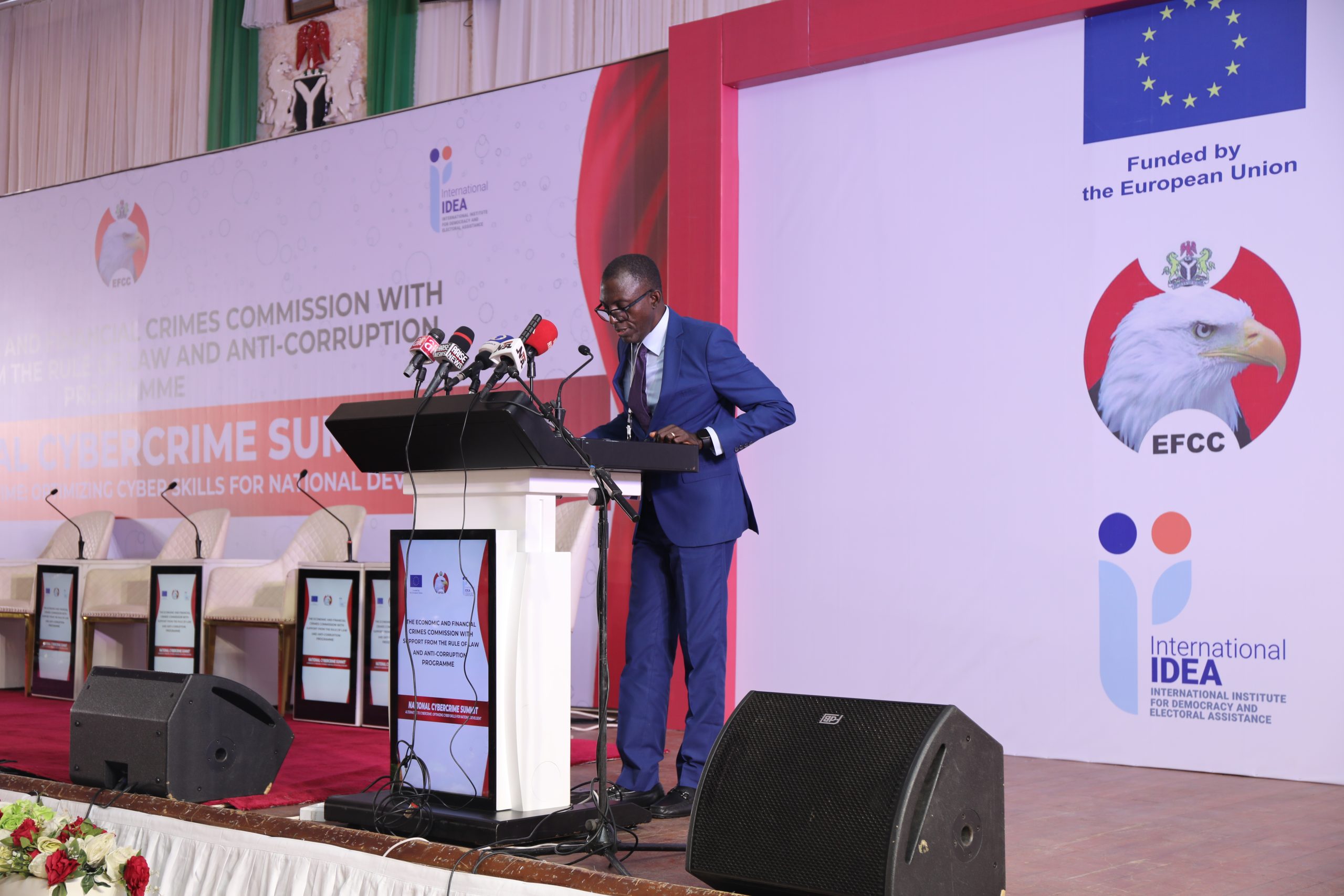•Calls for improved focus on digital education
Maureen Okpe
The European Union-funded Rule of Law and Anti Corruption (ROLAC II) Programme of International IDEA has emphasised the need for unwavering dedication and collective action of all anti-graft agencies, state governors and relevant stakeholders in the fight against cybercrime.
Head of Programme, International IDEA, Danladi Plang, made the call yesterday in Abuja in a chat with journalists after the Cybercrime Prevention Summit, with the theme: “ Alternative to Cybercrime: Optimising Cyber Skills for National Security”. The Summit was organised by the Economic and Financial Crime Commission (EFCC)in collaboration with the EU-ROLAC II Programme of the International Institute for Democracy and Electoral Assistance (International IDEA).
Plang charged the stakeholders to harness the power of collaboration and cooperation in advancing their shared goals of security and development for the country.
He reiterated the imperative of improving digital education in Nigeria, stating that the increase in technology has exacerbated the attention of criminals, especially the Nigerian youth.
“Because we use technology which offers us very easy ways and convenience for information transfer and storage, especially in the cloud, it has also increased the attention of criminals.
And that is why we have cybercrime.
“As technology progresses and our reliance upon it has escalated, cybercrime has also intensified. It has been said earlier on that we have a very large population of young people. They are not just young, but they are very versatile in the use of technology.
“When you have federal government agencies, whether it is the EFCC or ICPC or whatever government agency that is responsible for one function or the other, it is imperative that all arms of government, including the states, support that arm of government. When that arm of government succeeds, it is our collective success. When it fails, it is all our collective failure.
The Head of the Programme restated the readiness of the organisation to support, where necessary, the fight against cybercrime and crimes in general.
“I join those that have spoken earlier on to say that we are strongly behind you, to support you in this endeavour and all the other work that you are doing to fight economic and financial crimes and corruption in Nigeria. As has been said earlier, cybercrime is not a Nigerian problem alone.
“For us at International Idea, as I said earlier, we will continue to support this effort, not just on cybercrime, but other crimes as well. We believe that your success is the success of the country, and if you fail, the country fails.
“But we need to make this effort very conscious and very deliberate. It will not necessarily be abrupt. This summit, therefore, offers us an opportunity to help increase public awareness of cybercrime and strengthen our legal and policy measures.
“I am happy that this is not going to be all talk, but also action, given the fact that as a first step, the EFCC will today be launching its Cybercrime Rapid Response Center. The participation of our Royal Fathers is also very important. This is going to be a community effort,” he said.

The First Lady of Nigeria, Sen. Oluremi Tinubu, for her part, reiterated the need for a multi-dimensional approach in fighting the war against cybercrime in the country, stating the need for the involvement of various stakeholders in winning the issue.
This is as she noted that, cybercrime was not just a crime against individuals or businesses but an assault on collective integrity, the nation’s economic stability as well as the future of the youth.
She charged parents with the need to guide their children appropriately by inculcating good values, morals and a sense of patriotism.
Oluremi said, “We must emphasise and entrench the culture of hard work rooted in honesty and dignity of labour among our teeming youth.
“Parents play a pivotal role in raising and guiding their children and wards to be God-fearing. Bonds of trust and understanding should be created between parents and their children to allow for open communication, whereby their fears and insecurities could be addressed.”
Executive Chairman of the EFCC, Ola Olukayode, raised concern over the increase of cybercrime in Nigeria, disclosing Nigeria lost over $500 million to the menace in 2022.
Olukayode further disclosed that the Commission, in the year under review, convicted 3,455 suspects in Nigeria on cybercrimes, adding that about 2,328 cases of cyber fraud occurred daily worldwide.
He lamented over the advancement of technology and the dire situation created by cybercrimes as persons under the aegis of parents of Yahoo boys protest the arrests of suspects.
The anti-graft agency boss disclosed the Commission’s shift in operation from interrogation to making concerted efforts to provide solutions by redirecting the skills to control the situation, as Nigerian youths are highly resourceful and intelligent.
He said the commission was planning to launch a research and rehabilitation centre to educate people, especially ex-victims, to create opportunities for them to stop committing crimes.
Olukayode reiterated the need for the Nigerian government to provide working alternatives for its teeming youth, stating this will tackle the menace of cybercrime in the country, as the effects are grievous, distorting and corrupting acceptable family values.
He said, “The menace of cybercrime, like most economic and financial crime, is a burning challenge that we cannot ignore, deny or wish away.
“The tendency towards quick riches no longer positions our young people for enterprise, resourceful intellectual aspirations and technological innovations. Projections by multiple sources show that the global loss to cybercrime may reach a staggering 10.5 trillion dollars.”Show trimmed content

